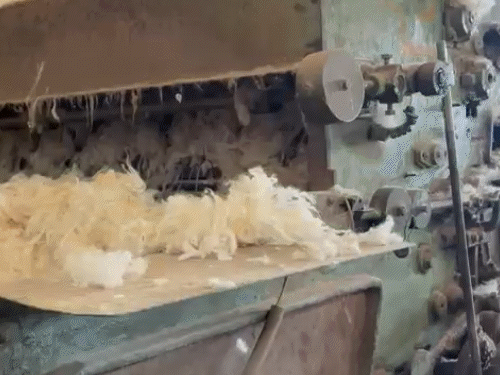In Rajasthan, the wheels of machines have stopped in the factories that make threads for carpets.
50 percent of the US tariffs have weakened the wool and yarn (yarn) industry of Rajasthan including Bikaner. Factories are on the verge of closure. Employment crisis has also arisen in front of one to one and a quarter lakh laborers and sheep parents.
,
Traders say- Due to tariff, the size of 1200 crore industry has started in the state. 150 to 200 crore orders have gone on hold. If the solution does not come out, the industry will end up to 70 percent within a year.
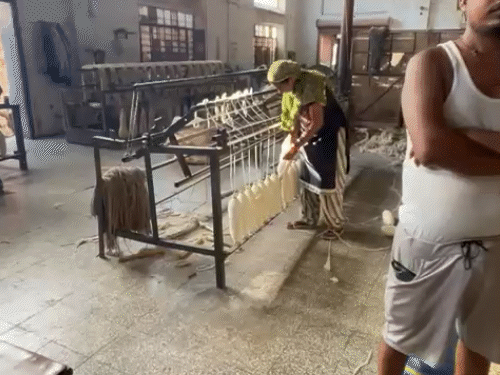
According to the Woolen Industry Association- If there is no financial assistance in Rajasthan after the tariff, then about one lakh people will become unemployed.
Rajasthan’s wool and yarn industry consume 70 percent of the US. Just as TV, refrigerator, washing machine is necessary in Indian homes, similarly carpets are essential items in America. People there apply it on the floor and walls.
State President of Rajasthan Woolen Industry Association Kamal Kalla said that there are 1.25 lakh people across the state including Bikaner, Beawar and Bhilwara, which are associated with Woolen and Yarn Industry. Among them, the maximum number of laborers is. Sheep owners also have a large number.
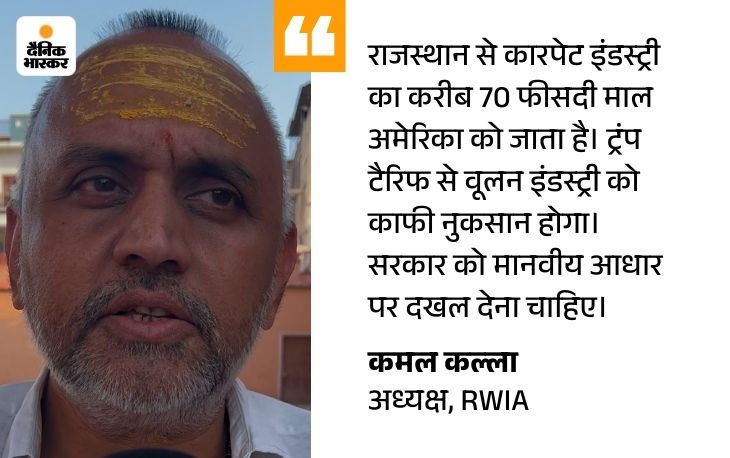
The American tariff is not only affecting the factory owner. There will be a crisis of livelihood for labor. If the order is 30 percent, then 70 percent labor will also be reduced.
2 to two and a half million kilos of yarn is made every day in Bikaner. Now it is half. It is also being stocked. Currently there is labor access, so they are stopping it and getting it done.
350 units are under threat In Rajasthan including Bikaner, about 350 units are made to make threads from lamb. The carpet is prepared with this thread. Carpet orders from the US have almost closed after 50 per cent tariffs. Due to this, carpet industry has come under the concerts across the country including Bhadohi in Uttar Pradesh. The direct effect of this is also visible in Bikaner and Beawar.
On August 27, the US imposed 50% tariff on Indian goods. Its impact is now visible on the Indian business, which used to be the goods America export. India’s products became expensive due to tariffs. Hence their demand in the US market is sure to decrease. Production will decrease due to export stopping. This is causing a crisis on employment.
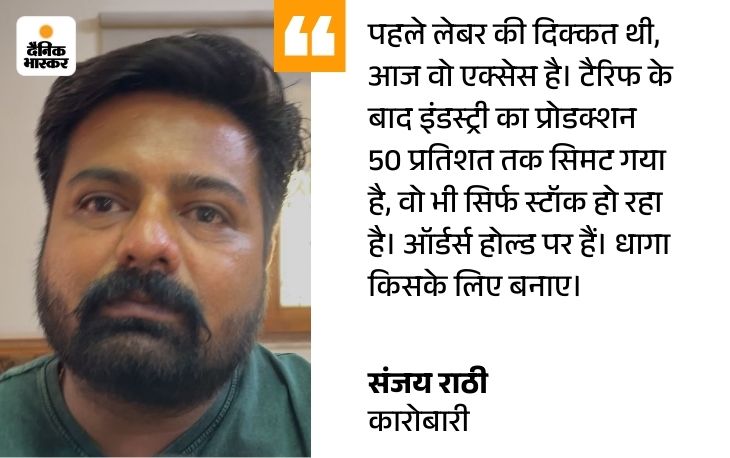
When there is no thread export, for whom will you make Sanjay Rathi, the director of the factory making thread in Bikaner, says- For the last one month, we are just making thread. Not exporting it. If there is no export thread, then for whom will we make?
Most of Bikaner’s thread-making factories are doing work as soon as possible, but the goods are not going further. In such a situation, how long can it be stocked. Given the situation, the work of making thread may have to be stopped in the coming days. If the central government does not provide financial assistance, then this industry can be closed.
If the workers go, you will not meet Workers working in wool and yarn factories come from Bihar and other states. The factory owners are getting the work done despite the order, so that the workers will stay here. They are afraid that if these laborers leave, they will not come back.
If the good days of carpet industry come after the tariff war is over, then they will not get laborers. Due to this fear, the stock is being increased at the moment, but due to lack of export, the stock is still unlikely.
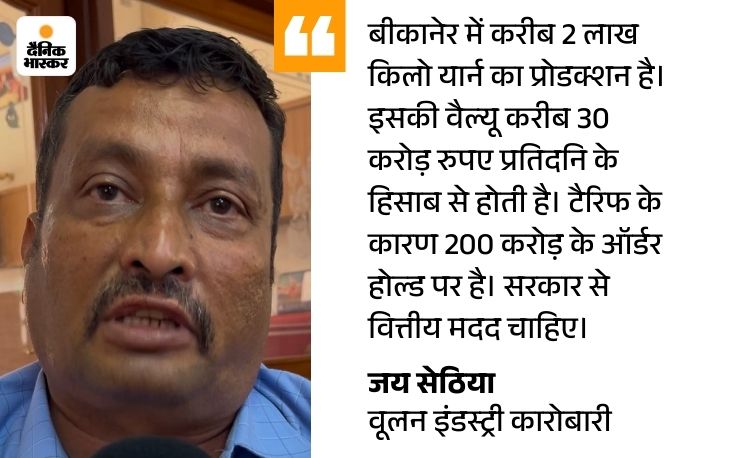
Getting up work to stop labor Jai Sethia, associated with the Woolen Industry, says that most of the carpets have come on the order hold. In such a situation, carpets are not being made. Due to this, orders of thread have also come on hold. In more than 300 factories of Bikaner, 150 to 200 crores are on orders hold. The units are slowly closing.
Orders of two-three months were going on before the tariff, but now they have stopped slowly. Only working to maintain labor. How long will it last?
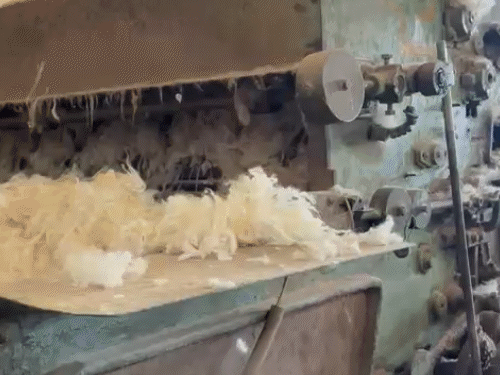
After the tariff, Rajasthan’s Woolen and Yarn Industry have declined. There is an assessment of a loss of Rs 150 to 200 crore every month.
Central government will have to take steps Association president Kamal Kalla says that businessmen and factory owners have been working with labor for a month but there is no order. Now a few days and without work labor can be kept. Once this labor goes away, it will not come back. Even if there are orders, work will be difficult.
Was an affordable rate, but increased after tariff Brijmohan Chandak, a businessman associated with the wool industry, says- the house is big in America, which also makes the carpet big. India’s rate is economical according to America, but prices have increased after tariffs. This is sure to stop the goods. This is directly affecting the factories and the yarn industry will end soon after slowing our speed.
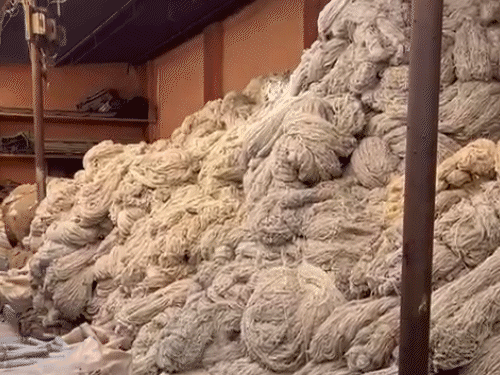
Traders say that the situation is bad after tariff. The goods are lying, but the orders are on hold.
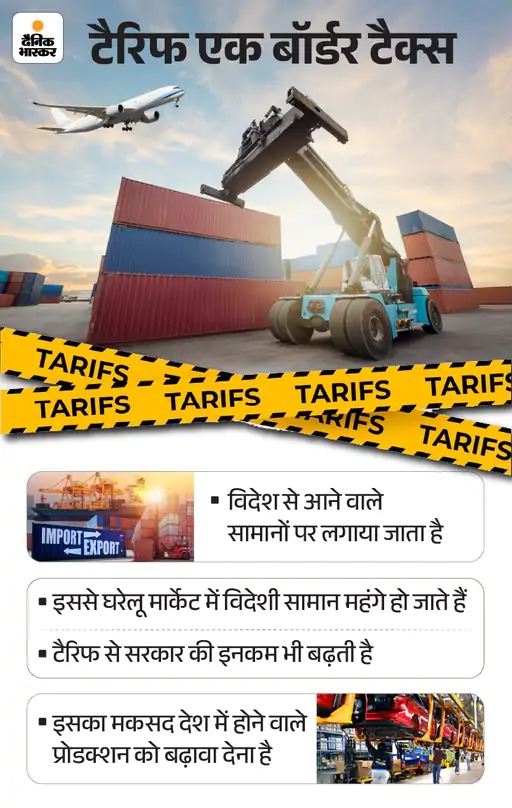
— Read this news also with the effect of American tariff …
Thousands of people in Rajasthan due to Trump: Jewelery industry loss of 2500 crores, old orders cancell, not getting new

50 percent of the tariffs of America are seen on the Gem and Jewelery industry of Rajasthan. The employment crisis has arisen in front of thousands of artisans in Jaipur, the largest center of Colored Gemstones. (Read full news here)
